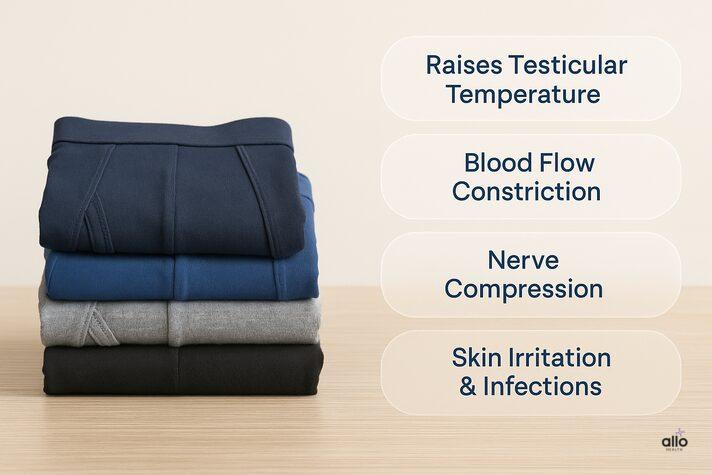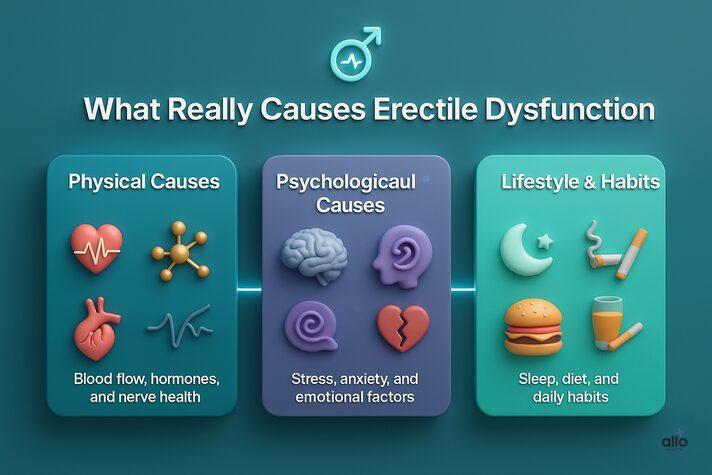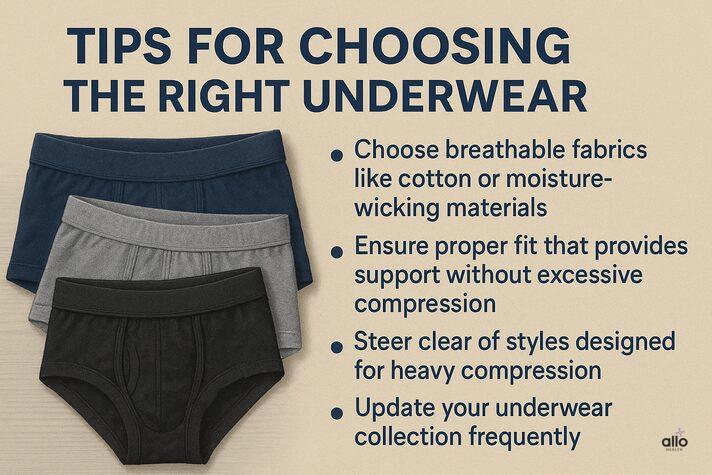Can Tight Clothing Cause Erectile Dysfunction? Myths and Facts Explained

Tight underwear does not cause erectile dysfunction. While snug clothing can raise testicular temperature and potentially affect sperm quality or fertility, there's no scientific evidence linking it to erection problems. ED is typically caused by health conditions like diabetes or cardiovascular disease, psychological factors, or lifestyle habits, not what you're wearing. If you're experiencing persistent erectile issues, consult a healthcare provider rather than just switching your underwear. That said, choosing breathable, well-fitting underwear can definitely improve comfort and support overall reproductive health.
Does tight underwear affect erectile dysfunction? It’s a common question men ask when they notice discomfort, reduced sensation, or even fertility concerns. The truth is, while tight clothing can affect sperm production and testicular temperature, there’s no solid evidence linking it directly to erectile dysfunction.
This article breaks down the myths and facts, explaining how tight underwear influences male reproductive health, what really causes ED, and how choosing the right fabrics and fit can keep you comfortable and confident.
Why People Believe Tight Clothing Causes Erectile Dysfunction
Many people wonder if tight clothing, especially tight underwear or jeans, can cause erectile dysfunction. This confusion comes from studies[1] showing that tight bottoms can affect male reproductive health, particularly sperm production and temperature regulation.
But does tight underwear affect erectile dysfunction? The short answer is no. There’s no direct scientific evidence linking tight underwear to erectile dysfunction in healthy men.
While tight underwear can raise testicular temperature, which may reduce sperm quality or fertility, this relationship does not extend to erectile function. Erections depend mainly on blood flow, nerve signals, and hormones, not the tightness of your clothes.

Effect of Tight Clothing and Underwear on Sexual Health
Tight underwear does not directly cause erectile dysfunction. It can still affect sexual and reproductive health in other ways.
1. Raise Testicular Temperature
The testicles sit outside the body to stay slightly cooler than body temperature, which helps them function properly, especially in sperm production. Wearing tight underwear or pants holds the testicles close to the body, which can raise scrotal temperature and negatively affect fertility by:
- Lowering sperm concentration
- Reducing total sperm count
- Affecting sperm motility and shape
A Harvard study[2] of 656 men found that men who wore boxer shorts had higher sperm counts. They also had lower follicle-stimulating hormone (FSH) levels than men who wore tighter underwear. The elevated FSH levels in men wearing tight underwear suggest the body is trying to compensate for reduced sperm production.
2. Blood Flow Constriction
Some sources suggest that very tight clothing or underwear might slightly reduce blood flow to the genital area. But there’s limited scientific evidence[3]showing that tight garments significantly restrict blood flow to the penis, which is essential for erections.
3. Nerve Compression
Extremely tight underwear may cause temporary numbness, tingling, or discomfort due to pressure on nerves or restricted circulation. These effects are usually mild, short-term, and reversible, and they do not cause clinical erectile dysfunction.[3]
4. Skin Irritation & Infections
Tight clothing can trap moisture and cause friction, leading to chafing, rashes, or fungal infections like jock itch. Poor ventilation makes the genital area more prone to irritation and discomfort.
5. Varicocels
Prolonged use of tight underwear may contribute to or worsen varicoceles, swollen veins in the scrotum that can affect testicular function and, in some cases, fertility.[4]
While these factors can indirectly influence sexual performance or comfort in some men, they do not necessarily cause erectile dysfunction.
If you’re noticing erection problems, it’s usually linked to things like stress, diabetes, or blood pressure, not your underwear. But feeling comfortable in what you wear definitely helps your confidence.

What Actually Causes Erectile Dysfunction
ED typically results from factors unrelated to underwear choice:
1. Physical Conditions
Health problems that affect blood flow, nerves, or hormones can lead to ED. Common examples include:
- Cardiovascular disease
- Diabetes
- High blood pressure
- Obesity
- Hormonal imbalances
- Nerve damage from injuries or surgeries
2. Psychological Factors
Your mental and emotional health also plays a big role in sexual performance. Stress, anxiety, depression, or relationship problems can affect arousal and erections.
3. Lifestyle Choices
Certain habits can harm your blood circulation and sexual health, including:
- Smoking
- Excessive alcohol consumption
- Lack of exercise
- Poor diet
These lifestyle factors can damage blood vessels and lower testosterone levels over time.
4. Medications
Some prescription drugs, especially for blood pressure, depression, or anxiety, can cause erectile dysfunction as a side effect. Always talk to a doctor before changing or stopping any medication.
5. Age
As men get older, testosterone levels naturally decline, and blood vessel elasticity decreases. These normal age changes can make it harder to get or keep an erection, though many older men still maintain healthy sexual function.

Signs Your Clothing Might Be Too Tight
Sometimes, your body gives small warning signs that your clothes are too tight. Watch out for these common symptoms:
- Groin numbness or tingling: Pressure from tight underwear or pants can temporarily affect nerves and reduce sensation.
- Red marks or skin irritation: Constant friction or lack of airflow can cause rashes or chafing.
- Testicular discomfort: Tight bottoms can push the testicles against the body, leading to mild pain or a heavy feeling.
- Excess sweating or poor ventilation: Limited airflow traps heat and moisture, increasing the risk of fungal infections and odor.
If you notice these issues, try switching to looser, breathable, moisture-wicking fabrics like cotton or modal. This helps improve comfort, circulation, and overall sexual health.

Tips to Choose the Right Underwear
While tight underwear doesn’t cause erectile dysfunction, choosing the right type of underwear can help improve comfort, hygiene, and overall sexual health. Here’s how to make the best choice:
1. Pick Breathable Fabrics
Choose underwear made of cotton, bamboo, or moisture-wicking materials like micromodal. These fabrics promote airflow, help regulate temperature, and prevent heat and moisture buildup, reducing the risk of irritation or infections.
2. Ensure a Proper Fit
Underwear should offer support without feeling tight or restrictive. A good fit allows healthy blood flow while keeping everything comfortably in place.
3. Avoid Excessive Compression
Skip styles made for heavy compression unless they’re meant for specific athletic activities. Constant pressure can trap heat and cause temporary discomfort.
4. Refresh Your Collection
Over time, underwear loses elasticity and support. Update your wardrobe regularly to maintain comfort and hygiene.
5. Choose Gentle Design Details
Look for smooth seams, soft waistbands, and tagless designs to minimize skin irritation and enhance everyday comfort.
6. Maintain Good Hygiene
Change your underwear daily to prevent sweat buildup, odor, and bacterial or fungal infections.
Key Takeaway: Does Tight Underwear Affect Erectile Dysfunction?
No, tight clothing or underwear does not cause erectile dysfunction. If you’re experiencing persistent ED, it’s best to consult a healthcare provider rather than just changing your underwear.
While underwear choice can influence fertility and comfort, it’s not a major factor in erectile function for most men. Focus on maintaining good overall health, regular exercise, balanced nutrition, and stress management to support optimal sexual performance and wellbeing.
"The following blog article provides general information and insights on various topics. However, it is important to note that the information presented is not intended as professional advice in any specific field or area. The content of this blog is for general educational and informational purposes only.
Book consultation
The content should not be interpreted as endorsement, recommendation, or guarantee of any product, service, or information mentioned. Readers are solely responsible for the decisions and actions they take based on the information provided in this blog. It is essential to exercise individual judgment, critical thinking, and personal responsibility when applying or implementing any information or suggestions discussed in the blog."






